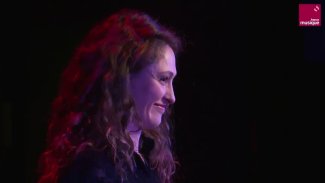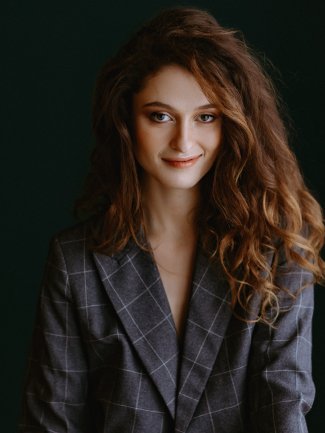
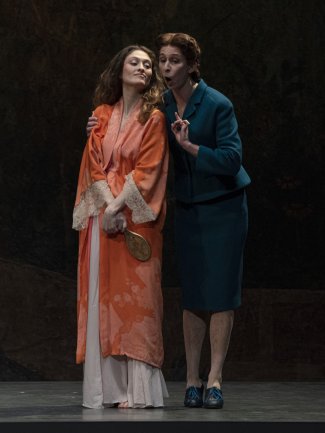
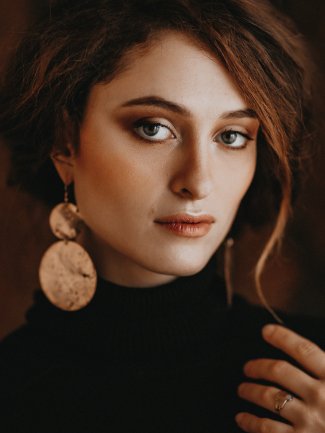
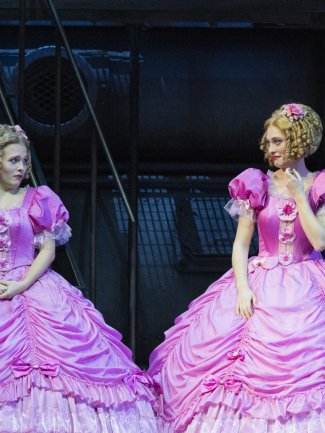
Marine Chagnon
Links
Download Assets
“[…] the striking Marine Chagnon … with a beautiful stage presence, a velvety timbre with clear nuance and impeccable diction.”
Classique News, January 2024
Marine Chagnon charmed audiences when she appeared in France TV’s iconic Victoires de la Musique Classique as “Révélation Lyrique” in 2023; and in a subsequent gala concert at Palais Garnier, broadcast by Arte and conducted by Gustavo Dudamel, she enchanted the house with her standout performance of Bernstein’s Trouble in Tahiti, showcasing her versatility across diverse musical eras.
A former member of the Paris Opera Academy, the 2025/26 season will see Chagnon debut at Teatro alla Scala — as Mercedes in Damiano Michieletto’s production of Carmen under their new music director, Myung-whun Chung; at Opéra Royal de Versailles as Métella in La Vie Parisienne in the production designed and directed by Christian Lacroix and at Opéra National de Bordeaux as Flora in La Traviata, conducted by Tito Ceccherini and in a staging by Pierre Rambert.
Graduating from Académie into the ensemble of Opéra National de Paris, Marine Chagnon carved out a distinctive presence on the main stage where her performances — ranging from Tebaldo (Don Carlos) and Zerlina (Don Giovanni) to the title-role in L’enfant et les sortilèges — revealed her as a natural performer of striking beauty; and her portrayal of Cicinella in Les brigands in Barrie Kosky’s outrageous re-staging of Offenbach’s operetta, allowed her to explore her gift of comic timing.
See More
Early music has played an important role in Marine Chagnon’s development with breakthroughs as Euridice (L’orfeo) at Opéra de Dijon and the title role in La Giuditta at La Grange au Lac, La Chaise Dieu and Auditorium du Louvre. She also sang the title role in L’incoronazione di Poppea with Le Poème Harmonique at Athénée Théâtre Louis-Jouvet and Grand Théâtre de Dijon.
Committed to her professional development, Marine Chagnon has taken masterclasses with some of the opera world’s most revered artists, including Ludovic Tézier, Anne Sofie von Otter, Barbara Hannigan and Mireille Delunsch, and has garnered numerous accolades in her time at the Paris Opera Academy including the Young Performer’s Prize at the Concours International de Mâcon, the Special Jury Prize at the Concours International de Canari; the Prix de l’AROP and the Prix Dauphin du Verna from the Fondation de France. This season she’s invited to join the prestigious Fondation des Treilles training programme dedicated to Rossini and led by Rockwell Blake.
A passionate advocate of under explored repertoire, Chagnon’s debut recording Ljus (Mirare) is a luminous collection of 20th-century Swedish songs reflecting her artistic curiosity recorded in collaboration with pianist Joséphine Ambroselli.
Contacts
Shirley Thomson Senior Director, VOICE at HarrisonParrott | Head of CSR Phaedra Mylona Artist Coordinator / Administrator
General Management
Phaedra Mylona Artist Coordinator / Administrator
Phaedra Mylona Artist Coordinator / Administrator
General Management
“Marine Chagnon plays a worldly Flora with a colourful and sensual mezzo.”
“… and even more extrovert, operatic vocality from mezzo-soprano Marine Chagnon, with velvety low notes of deep, bold colour.”
“Marine Chagnon’s Thibault stands out for the clarity of her singing.”
“Chagnon […] is not just a voice: she is also a storyteller whose narrative captivates the audience.”
“In the smaller roles, Marine Chagnon …. have both the accuracy and the mischievousness of their roles.”
“…the Flora of the young mezzo Marine Chagnon who seems more present with each appearance, as much by the radiance of a golden timbre, perfectly projected, as by the grace of a performance that already feels rich in experience.”
“Flora is the striking Marine Chagnon … with a beautiful stage presence, a velvety timbre with clear nuance and impeccable diction.”
“But it’s Marine Chagnon’s l’Enfant that is the stand out. Perfectly audible and intelligible, with a warm timbre, the singer presents a very nuanced character, both frightened and dreamy, making her ‘Toi, le cœur de la rose’ a pure moment of poetry.”
“L’Enfant is performed dynamically by Marine Chagnon, with careful phrasing … her sweet timbre, which gains weight in the high notes, is imbued with a round vibrato”
“Marine Chagnon presents a Zerlina full of youth and freshness”
“The true triumph is Marine Chagnon’s Poppea — noble, with a perfect tone and a certain je ne sais quoi in her delivery […] a Poppea truly worthy of the crown.”
“Marine Chagnon’s Poppea [… ] is both sensual and triumphant. Her voice is rich, with a superb timbre. She truly becomes the focal point of the work, commanding attention with every appearance.”
“…Chagnon’s mezzo voice renders the heroine more sensual than ever, with her creating a Poppée that is both spontaneous and enigmatic. She possesses an astonishing stage presence.”



